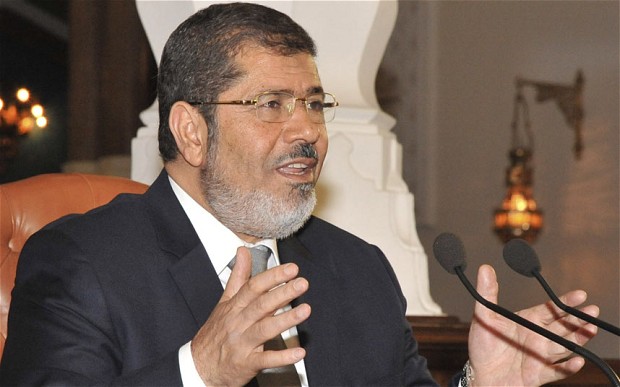In line with the path his dictatorial predecessors have trodden, President Mohamed Morsi of the Arab Republic of Egypt recently emerged as the newest dictator in Africa.
While the continent has been plagued with series of dictators both in the past and present, Mr. Morsi seems to come to the highly enriched specialized camp guided with revolutionist experience and wealth of intellectual expertise which is already earning him a contending place in the TIME’s Person of the Year list.
Coupled with such enviable PR effort, Mr. Morsi also shares yet, another common feature with previous African Dictators through a potential entrusted fund from the International Monetary Fund of up to $4.8billion. With a financial chest as this, as well as a bought rising reputation within the intellectual world, we might as well be witnessing the emergence of the most sophisticated DICTATOR ever in world history.
The seeming success of Mr. Morsi’s dictatorial effort does not come without damning consequences and victims. Ranging from the angered protesters at Tahrir Square in Egypt, to the throng of tax-payers from developed world whose taxes constitutes the entirety of Mr. Morsi’s potential IMF largesse.
Also included in the list are another set of victims who are inflicted by ignorance, lack of intellect or their level of gullibility. These include the devoted welfare government apologists who seem to be willing to endorse Mr. Morsi’s dictatorial edict out of party, ethnic and or government welfare blind sympathy. Another set include the series of otherwise innocent persons whose sympathy are in support of Morsi having been fed with sponsored propaganda in major national and international media outlets on the justifiability of Mr. Morsi’s actions.
Regardless of either side of the coin a victim belongs, Mr. Morsi can confidently be ascertained to have initiated, and cruising confidently on a Morsi-lization course of Egypt and Egyptians. A most recent quickened approval of a new Draft Constitution by the Country’s Islamic-dominated panel despite a boycott by 30 liberal and Christian members speaks volume of how confidently Egypt is being conveniently Morsi-lized.
The international community, especially skeptics of foreign aid stand in keen observation of the IMF’s stance on Morsi’s established dictatorial tendencies. The question lies in how reasonable it is to entrust a $4.8billionmonetary loan with a clearly prospective dictator and despite political instability in the country.
Mr. Gerry Rice, the IMF Director of External Relations in a recent IMF press briefing maintained as much; as the IMF Executive Board’s will require no major change in the economic outlook and implementation plans are sustained, the loan is well a reality. In retrospect, this means Mr. Morsi’s agenda will be well protected by an immense financial backing, despite serious signs of authoritarian rulership.
The people of Egypt and the international audience are left to strongly consider the implications of this financial backing on the economic and socio-political freedom of Egyptians and foreign investors in the country, as well as the concentration of “too much authority resting in too few hands” as expressedby the U.S. Secretary of State Hilary Clinton.
While the chance of a total breakdown of law and order through the ongoing political instability is not dismissible, the sustenance of economic investments remains under serious threat. How the IMF perceive this as no threat to the economic outlook of a country on the brink of breakdown, going by the momentum being gathered by protestersat Tahrir Square and the resultant spreadinto other cities of the frontline Arab nation, remains an open query before the final decisive seating of the Fund Board this December.
Like his authoritarian predecessors, and the current trend of happenings within the ruling Muslim Brotherhood party, much more can yet, be expected of Africa’s newest dictator which might possibly include an absolute monopolization of power, violent crushing of the opposition, shutting down of press and free speech and impoverishment of Egyptians at the benefit of an increasingly enriched ruling elite.
While protesting and elongated stay at the popular revolutionary Tahrir Square and other protesting locations holds as much possibilities and realities, the protesters (which Mr. Morsi once belonged to) must do more in equipping themselves towards handling the present situation. Intellectual enrichment will go a long way in not only seeing through the protest to a return of representative and participatory democracy, but also in dealing with its aftermath.
An act of tyranny must be rejected and fought against, and more importantly as Joachim Nabuco stated, “educate your children, educate yourselves in the love for the freedom of others, for only in this way will your own freedom not be a gratuitous gift from fate. You will be aware of its worth and have the courage to defend it.”
These were the very understanding and qualities found wanting in the ex-freedom fighter turn freedom abuser, Mohamed Morsi, ruler and Morsi-lizer of Egypt.
Fiyinfoluwa Elegbede, a major contributor to the VOICE OF LIBERTY AFRICA platform writes from the United States



